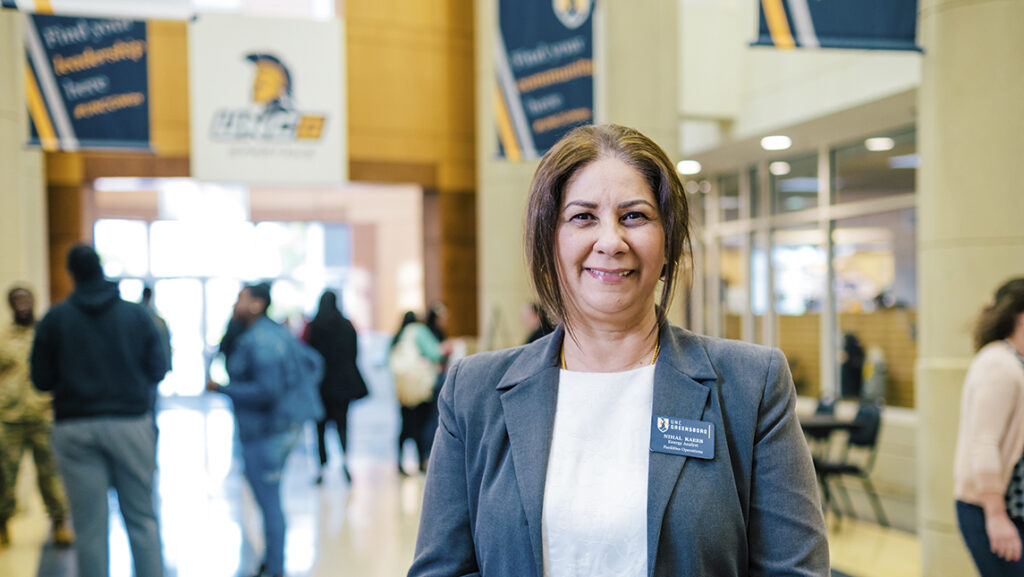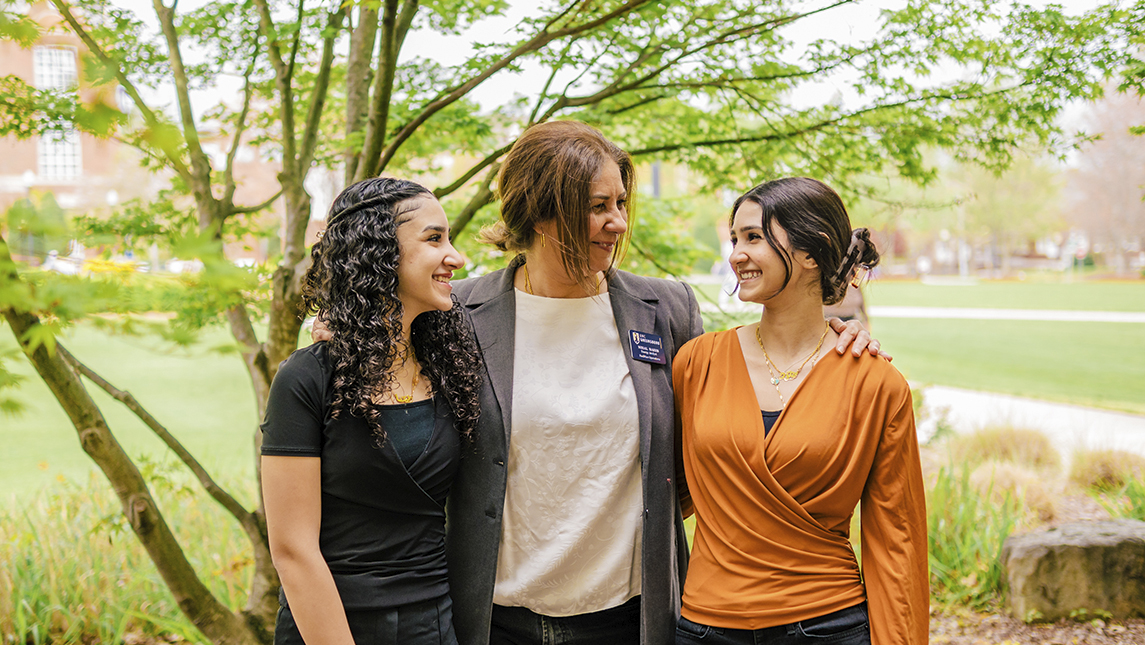It’s spring on UNCG campus, and Nihal Raees looks lovingly at two of her five daughters, current UNCG students, as they fuss over each other prior to a photo shoot. This small moment is one that Raees could only hope for when life as she knew it in Baghdad ceased to exist in the spring of 2003.
After immigrating with her family to High Point in 2009 and starting life anew, Raees is now an energy analyst for UNCG Facilities Operations, and all five of her daughters are Spartans. She shared her remarkable story of resilience and faith.
Resilience Is a Way of Life
Growing up in Baghdad, Raees says uncertainty and danger were a part of life due to the unrest in the area, but she had a great life. The second youngest of 11 children, Raees had the support of her large family.
“We had everything at our fingertips. Yet from 1980 to 2003 was a period of instability for our people, and it wasn’t easy,” Raees says. “I remember when the war with Iran started in 1980. We had our first day of school. They sent us back. It’s war, no school. It started to be part of life, ‘Oh, there’s a war. Go to school, come back.’ We lived. We are resilient people.”
Everyone in her family was well-educated and professional. Six of her brothers were required to serve in the army. Raees graduated from the University of Baghdad and became an architectural engineer. In 1988, she began to work as an engineer for the government.
“I was very passionate about architecture, and I loved my work. I won a few national architecture design competitions. So I loved it,” Raees says. “Once I married my husband – he’s a major general and an engineer – and we had our first three daughters, it was unsafe for the kids, so I had to leave my work. Later, my husband and I opened an engineering firm.”
The pair ran their successful consulting company for many years. Following the U.S. invasion of Baghdad in 2003, they worked with the U.S. Army Corps of Engineers until 2006. During their work with the U.S. Army Corps of Engineers, life became unsafe for her husband. Now parents to five young daughters, they had to flee the country.
“Nihal’s personal journey from war in Iraq to the life she and her family have built in North Carolina should serve as a beacon to all people in pursuit of the American Dream.”
Bob Shea, Vice Chancellor Finance and Administration at UNCG
A Family on the Run
“We fled to Jordan; my youngest was only one year-old,” Raees says. “We could do nothing. Our life was on pause. We drained our resources. We were in shock and uncertain about everything.”
After three years in Jordan and the realization that they could never be safe in Iraq, they were offered a special immigrant visa to the United States. With no way to earn a living and at the end of their resources, they had a decision to make.
“We were looking at each other. Can we make it? Can we stay here? It was a hard decision,” Raees says. “We knew we would have very little resources and a big language barrier, but we also had big hopes to be safe. That was the most important thing, just to be safe for the kids.”
In 2009, each with only two suitcases in-hand, the Raees family immigrated to the United States. The program placed them in High Point. They had nothing, but they were safe.
Starting Over
“The first thing we had to do is figure out how to start over. It wasn’t easy but we had to endure the hardships for us to move forward and start a new life,” Raees says.
Through her connections with the immigration program, she began work at High Point University in the cafeteria during the day and at Polo Ralph Lauren warehouse during the evening.
“I was working two jobs just to make ends meet and to support my family,” Raees says.
After two years, Raees found a way to put her professional experience and training as an architectural engineer to work. She started an internship with an architecture firm. She worked on projects for Triad Math and Science Academy in Greensboro, the Drama and Dance Studio renovations at the UNC School of the Arts in Winston-Salem, the 16th Mosque renovation, and Cone Health’s Spectrum lab in Reidsville.
By the fall of 2011, she was accepted to NC A&T where she earned her Masters in Civil Engineering and PhD in Computational Science Engineering.
“Everything was different from the training I had in Baghdad. The language barrier was, of course, an issue, but different measurement systems and computer programs,” says Raees. “It was difficult at first, but I got through it and received my Master’s and PhD along with my husband.”

A New Home at UNCG
Before finishing her degrees in December 2016, Raees joined UNCG in the Facilities Operations Department where she works in-depth with utility infrastructure.
“I love my department. We are the people behind the scenes. We are the ones making the campus buildings beautiful, clean, and environmentally comfortable, so the faculty and students have the best campus,” says Raees. “So it’s an incredible department with limited resources, but we make it happen no matter what.”
And she’s not kidding. When faced with a projected $1.6 million increase in utility spending for this year, her director prompted Raees and her team to find a cheaper way of procuring natural gas and electricity.
Raees worked internally at UNCG and externally with vendors and the state to save UNCG $600,000 of the original $1.6m projected on natural gas and electricity.
“Nihal and her team are bringing into action Chancellor Gilliam’s charge to innovate and reinvent here at UNCG,” says Bob Shea, Vice Chancellor Finance and Administration at UNCG. We are grateful for Nihal’s dedicated effort on behalf of the UNCG community. She makes me proud to be a Spartan!”
Raees considers it just part of the job and says she would do anything for her team. “I love them. We are all a big family here.”
“This is why we did this. So our daughters would have the opportunity to live, work, and be safe. They can go anywhere and do anything.”
Nihal Al Raees
Safe and Thriving
Raees and her husband have achieved much since immigrating to North Carolina. They’ve learned a new language. They’ve earned advanced degrees in architectural engineering. They’ve made a living and a life here. And their five daughters are safe and thriving – and UNCG alumni.
The eldest, Buthainah, BS ’15, received a prestigious Graduate Research Fellowship from the National Science Foundation, finished her PhD in Chemistry at the University of Utah, and currently she is a scientist researcher and method developer at Biogen in Durham. Rawaa, BS ’15, went on to medical school at UNC Chapel Hill and is now a M.D. resident at Christiana Care Delaware. Jehan, BS ’19, is preparing for the LSAT and is a paralegal at Law Firm Carolinas. The youngest daughters are still current students at UNCG in the Bryan School of Business.
“This is why we did this. So our daughters would have the opportunity to live, work, and be safe. They can go anywhere and do anything. Though I wish they could all be closer to me,” says Raees.
“Nihal’s story is a story of inspiration, determination and love, in both her professional and personal life,” says Shea. “Her personal journey from war in Iraq to the life she and her family have built in North Carolina should serve as a beacon to all people in pursuit of the American Dream.”
Raees remains close with her family in Baghdad, talking with her mother or sisters on her morning commute. She visited Baghdad twice to see her family, but it is still unsafe for her and her husband in Baghdad. “I love my native country Iraq, but here in the United States, my kids and I can design our path the way we dream and be safe”
Reflecting on her family’s remarkable, resilient journey thus far, Raees offers, “There’s a quote that has been in my mind by Kristin Kreuk: ‘Life is about change, sometimes it’s painful, sometimes it’s beautiful, but most of the time it’s both.’”
Story by: Alice Manning Touchette
Photography by: Sean Norona

UNCG is hiring.
Learn more about employment opportunities.



